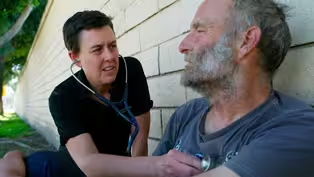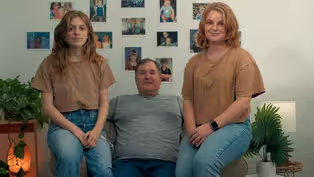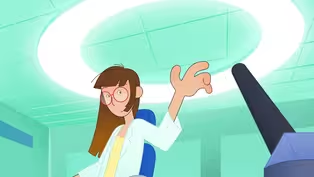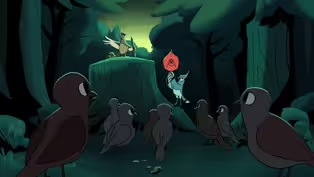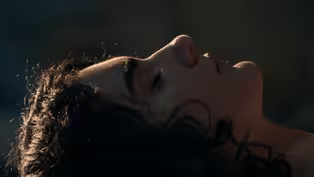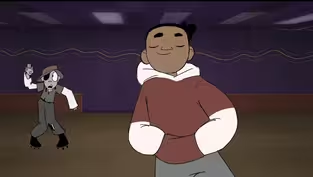
A Hand to Hold
Clip: Season 25 Episode 5 | 22m 53sVideo has Closed Captions
In L.A., a Street Medicine team brings care and hope to the unhoused. (Reed Martin/USC)
In the heart of Los Angeles, two individuals from an innovative Street Medicine team travel from location to location to deliver care, hope, and connection to their unhoused patients. (Reed Martin/USC)
Problems playing video? | Closed Captioning Feedback
Problems playing video? | Closed Captioning Feedback
Fine Cut is a local public television program presented by PBS SoCal

A Hand to Hold
Clip: Season 25 Episode 5 | 22m 53sVideo has Closed Captions
In the heart of Los Angeles, two individuals from an innovative Street Medicine team travel from location to location to deliver care, hope, and connection to their unhoused patients. (Reed Martin/USC)
Problems playing video? | Closed Captioning Feedback
How to Watch Fine Cut
Fine Cut is available to stream on pbs.org and the free PBS App, available on iPhone, Apple TV, Android TV, Android smartphones, Amazon Fire TV, Amazon Fire Tablet, Roku, Samsung Smart TV, and Vizio.
Providing Support for PBS.org
Learn Moreabout PBS online sponsorshipHave you all seen Art or heard from Art or Sean?
No.
Nothing?
I gave you Art's phone number.
Yes, I called him.
Far-fetched.
Let me go through my texts.
I have a number for his niece.
She seems to keep track of him.
I can reach out to her and see if it's okay for me to pass over her number to you.
All right.
They're over by where Ray's at right now, but April's not there.
Do you know where Ray is?
-Oh, I don't.
-Oh, okay.
I see.
They're over by the walkway.
Oh, okay.
All right, let's go.
Hi, Ray.
How's it going?
Nice to see you.
Hi, there.
I'm Jack.
You can take off this part.
Let me see.
This part can just come off unless you like it on.
We were just telling him that he got this removed finally after 15 years.
It does look good.
No fever or chills, right?
No.
Last time, your blood pressure was a tad high so I wanted to check on that again and see where you're at.
Did I do something I wasn't supposed to do right before you got here?
Oh, today or last time?
-Last time.
-Last time?
Okay.
Obviously, it makes your blood pressure go up but-- let's see where it is today.
It's always meant a lot to me to want to level the playing field.
I think that's probably why it fits really well for me to be in street medicine.
I got a brand new stethoscope.
You're going to be the first person I ever use it on.
148 over 92.
It's not to earn money.
It's not to make a name.
It's literally how do we make this situation better in any way that we can?
69,000.
That's how many people are homeless across LA County.
Despite billions spent at the local, state, and federal level, more people are falling into homelessness than are getting out of it.
The number of homeless deaths has gone up from about two a day back in 2014 to almost five a day in 2020.
Mayor Bass sent out a tweet saying, "Successfully confronting the homelessness crisis is a matter of life and death."
[music] Starting last year, the USC Street Medicine Program sent out a team of healthcare professionals five days a week.
This team is made up of doctors, nurses, physician assistants, community health workers.
USC's is unique.
It goes one by one to each patient that they serve.
It's truly life-saving work.
[?]
or whether-- [?]
Maybe we'll bring one.
You want to get checked up or you-- if you need anything, man, let me know.
Again, this is Gilbert with Street Medicine.
All right.
Did you get that address?
Yes.
There's going to be two new people.
One is brand new.
She needs the Department of Health.
and then the other person just needs, I think, some disability forms signed.
Our patients are not treated as human.
Certainly, at best, they're a number.
and at worst, they're garbage or trash.
Maybe we give them hope that they won't always feel that way.
[music] I've been a physician's assistant for 17 years.
The first job was five years in HIV medicine in Brooklyn, New York and then I moved to New Mexico, just doing primary care there.
Lastly, I did almost seven years in a private practice, primary care.
I honestly feel like everybody that I'm working with really cares about what we're doing.
[?]
Ask Larry because he knows about it, and he can make sure that-- Okay.
You've talked to the Grand already?
Yes.
Larry's at the Grand.
Gilbert is incredibly gregarious, likable, outgoing.
I feel like he can talk to anybody and is also truly interested in everybody.
He's kind and accessible.
People want to talk to him.
He's just an awesome guy to have on our team.
I used to work in Skid Row.
I was an outreach coordinator out there.
I fell in love with just talking to people.
Milk, because I'm a milk drinker.
If I could drink a gallon, I would.
2%?
Any.
It don't matter.
Low-fat, non-fat, 2% [?]
I'm the handshake, basically, between the team and our patients.
I do have some brief questions.
[?]
When it comes to food, how much food do you have a day?
I eat a meal a day.
-A meal a day?
-Yes.
Do you have access to a bathroom at all during the day?
Yes, at the gas station if it's open.
If not, you have to use outside.
Right?
Yes.
What about clean drinking water?
Do you have access to water?
No.
No?
They turned all the faucets off around here.
Okay.
We're there to help somebody, get them grounded and then build those friendships, build those relationships.
That's awesome because I could always use more friends.
[laughs] Did you grow up in El Monte?
No, I grew up in East LA for 12 years.
Oh, okay.
What part?
Right by Garfield High School.
Fourth Street and Fraser.
I was off of Atlantic and Fraser.
-I know exactly where that's at.
-Right there off Hubbard.
Yes, I know exactly where that's at.
I went to Griffith for sixth grade.
I have experienced a lot of loss in my life.
I lost my firstborn.
I lost my mother.
I lost my brother.
[music] I think that plays a huge factor in just who I am and how I can effectively support those who are outside.
[?]
Yes, I know.
[?]
I offer you harm reduction and stuff like that, too.
Tell me what that's like.
Good.
That's good because-- yes, so we won't get sick.
Give you clean products and stuff.
Yes.
Just in case, man, if you know anybody that does heroin and is around you, that Narcan helps, bro.
If they go under in front of you, potentially you could save a life.
Again, remember that once you distribute it, you're calling 911.
Despite if they get pissed off, if they're killing the high or whatnot, all right, you've got to call that 911.
-Okay.
-All right?
I will.
I hope I don't mess up and fail at what I do.
[background converation] I'm hoping that we grow so much to where we can make a huge impact on Los Angeles.
When?
When I don't have nothing to do-- When what?
When I don't have nothing to do, because [?]
Oh, okay.
When you can afford to?
Seven months, I've been with the street medicine team.
There's all these various struggles that I feel like I can relate to.
I have multiple sclerosis and thank God, I do really well with it.
I suffer from major depressive disorder and take medication for that.
I do well on it.
Therefore, I feel like there's something good I can offer other people, like, "Oh, you suffer from this?
Try this, it works for me."
[background conversation] -You do feel like you're [?]
better on the [?]?
Yes.
Definitely, definitely.
-Okay.
Awesome.
I love it.
[crosstalk] I'm not crying as much.
[chuckles] Okay.
I love it.
Okay.
I was 17 when I first became homeless.
Not knowing certain things and coming out here, I was really naive and young.
I didn't really know how evil people could be until I got out here, to be truthful.
I really didn't have anyone to talk to, but when I met Jack-- They came with their positive energy, and their smiles, and like, "Okay, we got you."
Like, "We'll take this as we got to do."
Me being in my spot and them coming out is like-- I'm not going to cry about it, but-- I wouldn't have went to the doctor.
I wouldn't have probably got medicated.
I probably wouldn't have went to a psychologist.
[music] The good news is that your bloodwork came back looking really good.
-After seeing that-.
-That's good.
I was like, "Oh, no, I hope there's nothing really bad there," but there's not.
They've literally changed my life for real, for real.
[background noise] This is the first job that I've ever had that feels more like a calling.
I'm spending eight hours a day as doing something that I would do with my life.
Deep breath in and out.
Like I said, it's just really hard for me to get to it.
I'm like, "I don't want to use Fentanyl."
I don't want to.
I wasn't ever really a heroin or opiate user.
I started doing it, and it just got me.
This fentanyl is a lot different than heroin.
You can die.
You can die at any moment.
I can take a hit, and I could die.
'You know what I mean?
Even if I've been smoking it for years, it could be my hit.
Usually people are self medicating, when they start using.
It's only been the last week, I think, that I've been really emotional.
Today's the year that my dad's been gone.
I think that has a lot to do with it too.
I think it is not something that's going to happen all the time.
I think I'm going through it right now.
I'm sorry.
It's a lot.
Like I said, usually people start using because there's stuff that's hard to fix.
I hoped in this job I would make a difference in terms of just being a person who is real and accessible, and maybe making someone feel less alone.
I think I see the things I need to do, and I'm not quite there in some of them.
It's so frustrating.
Some of them, you clearly are.
Reaching out for Suboxone is huge.
I think, obviously, stopping the narcotic, particularly, if it's fentanyl is number one.
The reason I was asking about the other things like depression is because sometimes being on an antidepressant can help while you're going through hard stuff.
Hopefully, I can get some help here with you guys.
I hope.
I really do.
[music] We work in healthcare.
We know that the system is not doing what it should be doing.
We come to work every day trying to make it better.
We'd been seeing a young guy, and him and his mom who live in an RV.
We found out that he had last seen a doctor in December of 2020.
I was pretty sure that he had a blood clot in his lung.
I convinced him to go to the emergency room.
There's a pretty easy test that would rule it in or rule it out.
They didn't do it.
Then yesterday we were out and his mom texted me and said, "Are you coming?"
I called to find out what it was.
I really think that what he needs, we definitely can't do from the street.
Unfortunately, I'm not going to be able to do a cat scan of his lungs.
If he can't even walk a few steps without having trouble breathing, he should be going by ambulance.
If it's a clot to his lung, that's obviously a deadly situation.
Text me where he is so that I can get results and records and stuff.
-Okay.
-Okay.
All right, Maria.
All right.
Take care.
Okay?
Okay.
Bye-bye.
[music] I actually just got really awful news that one of the patients-- It's actually someone you guys didn't meet.
You know that RV that we go to, and he never wants to-- he didn't see anybody?
He passed away this morning.
He was young.
He was in his 30s.
Oh, where are we going?
I don't know.
It's so complex.
There's so many layers to getting here or not.
[music] It was just the two of us.
He was my best friend.
I, hopefully, was his best friend.
There's only so much that Jack and the crew could do.
They don't have the machinery to be able to take the scans they need to.
It had to be the hospital that took care of it, and they dropped the ball.
Now he's gone.
[sobs] Remember, because you're homeless, you are still a person.
You are worth something.
In the seven months that I've been working with street medicine, this young man would be the third person who's passed away.
I don't even know that we're making a trajectory towards wellness half the time.
I think a lot of times people that are unhoused are let down by systems.
I want them to know that we do care and that we want what's best for them.
What's kept you out here?
Just living.
I grew up right here.
I lived in Rosebery most of my life.
I was in East LA.
I've been homeless myself.
Me, and my pops, and my sister.
We lived in a hotel for eight months at the Days Inn.
I was young.
I didn't know what was going on.
Although we never lived on the streets, this is pretty close to living on the streets as we got.
What we have behind me is the Days in where we actually lived for a little bit, but now it's a recup care.
It's come full circle.
A few weeks ago, we actually dropped off a patient here for the recup care.
When I realized it's where we were at and where we were going, it shocked me a little bit.
[music] I just want to be that type of support for somebody outside too, someone who people could look to and find hope in.
I think there's a lot of letting go that a person has to do.
Hey, are you guys here?
Just being human, which this whole thing is about, is like, "Well, sometimes it doesn't get better.
I'm lucky if someone's there with me sitting with me."
That's something we can always do.
Hey, Ruben, if you look straight at me, can you see?
I could see you from close up.
Not far?
From far away, I can't.
How long has it been going on for?
We need to get you into an eye doctor because diabetes can really damage your eyes.
All right, so these are the reading glasses.
We got brown.
You can choose which one you like.
We got blue.
I think you had blue one other time.
I want blue.
You want blue?
[?]
Oh, yes.
That's better?
Okay.
Awesome.
I love the blue on you too.
-I could see.
[chuckles] 50% off.
These little ones, I can't read it.
You still can't see it?
I can see CBS pharmacy.
Okay.
It's -.
I thought the realization that maybe what we're doing most and what's most important is just that showing up with love.
Just having those encounters that it's like, "I see you, and I'm here with you."
[music] Human connection is medicine, and we've just fallen away from that in a lot of ways in our current structure.
I think there's a lot of things that are happening without us ever reaching into our bags.
I'm always talking about love.
It's easy to love somebody when they're easy to love.
When they're hard to love, I think that's what the test is all about.
Ultimately, it's all about building relationships and helping people [?]
at a time.
[music] Love is something, just give it away and you end up getting more.
It's like the big secret.
[laughs] [music]
The Unexpected Drops In (Preview)
Preview: S25 Ep5 | 30s | Six short films from SoCal Students at CSUN, LMU, ArtCenter and more. (30s)
Clip: S25 Ep5 | 21m 28s | An innovative Street Medicine team travels LA caring for unhoused patients. (Reed Martin/USC) (21m 28s)
Clip: S25 Ep5 | 48s | A scientist discovers a mirror mini-world through her microscope. (Jiamu Tao/USC) (48s)
Clip: S25 Ep5 | 3m 30s | A Dove and Blue Jay lead a bird revolt against greedy King Pigeon. (Huanran Mao/ArtCenter) (3m 30s)
Video has Closed Captions
Clip: S25 Ep5 | 9m 36s | A painter questions reality when her nightmare creation escapes the canvas. (Chris Allan/LMU) (9m 36s)
Clip: S25 Ep5 | 2m 54s | In a post-apocalyptic world, a lonely zombie learns to skate and find friendship. (Kayla Dennis/APU) (2m 54s)
Providing Support for PBS.org
Learn Moreabout PBS online sponsorship

- Arts and Music
The Best of the Joy of Painting with Bob Ross
A pop icon, Bob Ross offers soothing words of wisdom as he paints captivating landscapes.












Support for PBS provided by:
Fine Cut is a local public television program presented by PBS SoCal
